Task paralysis is REAL. Quite that voice inside your head saying you're a lazy procrastinator. You're not alone in this struggle.


Do you ever find yourself wasting hours of time dreading a simple task that takes minutes to complete?
Yep, me too.
Have you ever gotten 90% done with a task, lost interest, and then felt like the last 10% was physically impossible to complete?
Are you drowning in almost-finished projects?
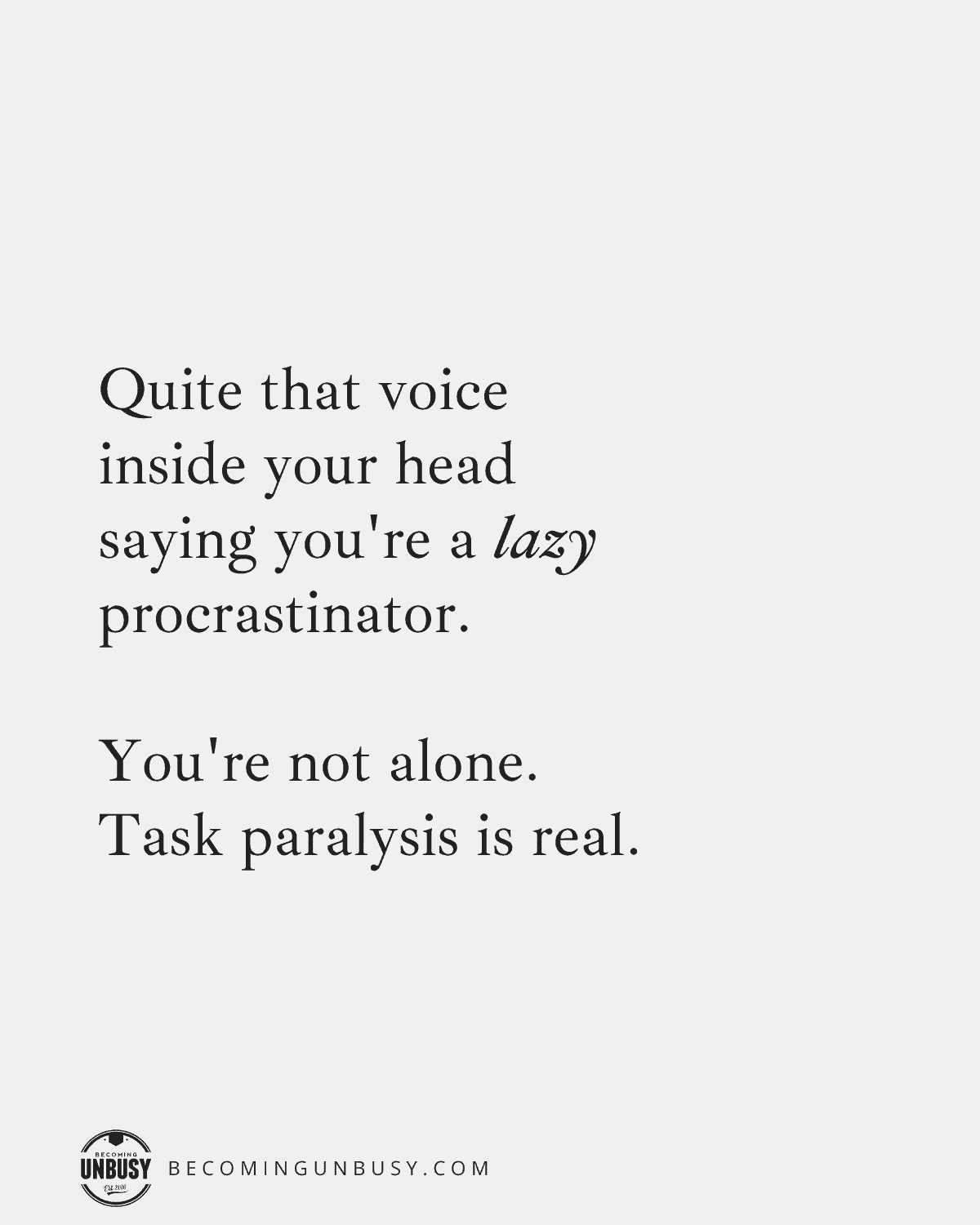
In this article, we'll delve into what task paralysis is, how it relates to being neurobusy, and some strategies for overcoming it.
Whether you're neurobusy, have a neurodivergent person in your life, or are just curious to learn more about this phenomenon, this article is for you.
In a rush? Jump to the section of your choice or scroll to the very bottom for a quick summary of key points!
What is task paralysis?
Task Paralysis is the inability to take action, even if you know something is important and desperately want to complete a task. It is a common experience for neurobusy people.
It feels like having a bottleneck in your brain that's blocking you from being motivated to take action.
Task paralysis does not mean that your body is physically paralyzed, although it might sometimes feel that way. Rather, your neurobusy brain is preventing you from getting the motivation you need to start a task.
Task paralysis is widely used to describe the experiences of neurobusy people and their difficulty with starting tasks, finishing tasks, or the overall avoidance of certain tasks altogether.
How does it feel?
Task paralysis feels a bit like being stuck in a traffic jam.
You know a task needs to be completed, you're aware of its importance, and you're even eager to complete it, but you're just stuck. Task paralysis feels like neurobusy gridlock.
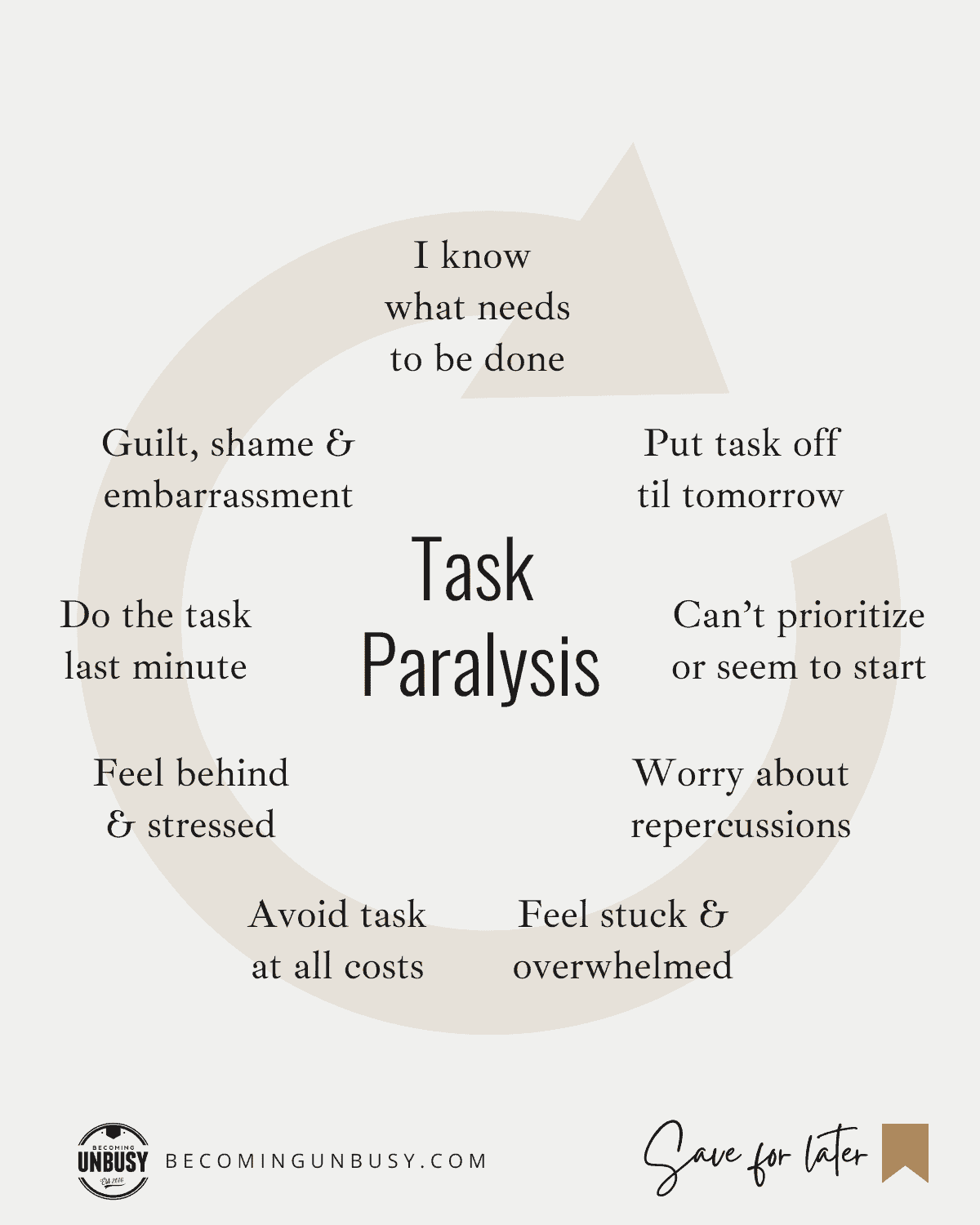
The worst part of task paralysis is that sometimes you know not completing the task will disappoint someone you love, damage a relationship, or cost you an amazing opportunity. Yet, you still can't do it.
Is task paralysis real?
Yes, task paralysis is real!
The term doesn't mean that the person is physically paralyzed or unable to move their muscles. Rather, it refers to a mental state of overwhelm (related to the prefrontal cortex) in which someone cannot motivate themselves to finish a task.
Again, this is a common experience for neurobusy people.
You are not alone.
Common symptoms
How do you know if you're experiencing task paralysis? Here are some common symptoms:
- Avoiding simple tasks like making doctor appointments, scheduling online bills, or completing chores
- Using a "noble distraction," such as checking email, to avoid doing the one thing you're supposed to be doing
- Needing to wait until the very last possible moment to be motivated to complete a task
- Increased rejection sensitivity, worrying about how failing to complete a task will affect a personal or work relationship
- Increased shame and negative self-talk
- Increased stress and anxiety
This is not procrastination or laziness
Don't confuse task paralysis with casual procrastination, where you put off or delay doing tasks. Task paralysis is a debilitating state that leaves you powerless against waves of shame, doubt, or dread.
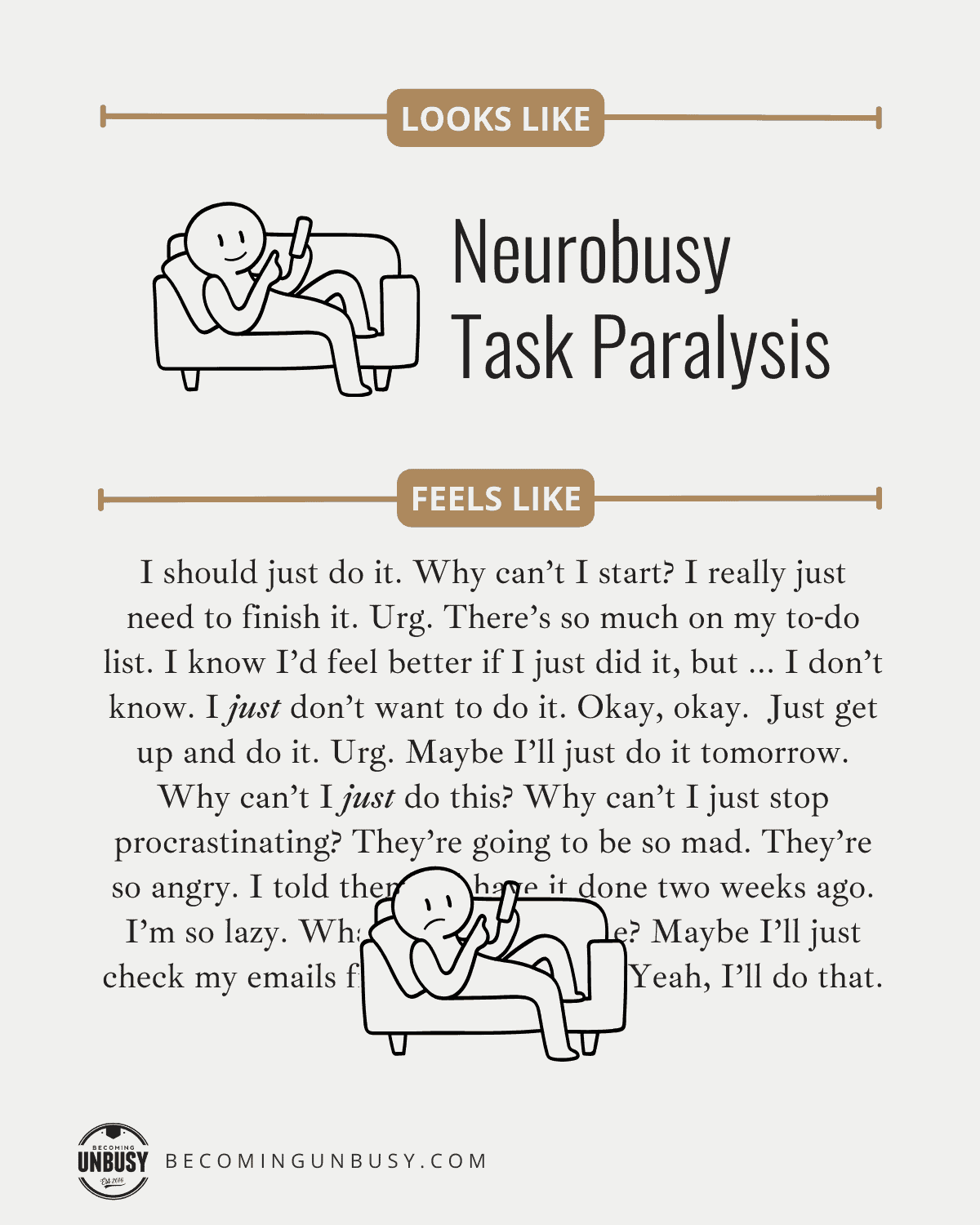
It can be hard for others to understand why you experience such difficulty with seemingly simple daily tasks. You may appear indifferent from the outside; as a result, they might express frustration or annoyance.
Because of this, you may experience shame, fatigue, and guilt as a result of task paralysis or other neurobusy symptoms.
Over time, these negative messages sometimes morph into a nagging inner voice constantly telling you that you must stop procrastinating and being lazy.
This can cause a downward spiral, leading to even more task paralysis and shame.
Contrary to what it may seem to those who may not understand the phenomenon, task paralysis is not laziness!
Task paralysis is the result of being overwhelmed or having comorbid conditions that cause neurobusy people to have difficulty with things like planning, completing multi-step processes, switching tasks, and motivating themselves.
Essentially, chronically overwhelmed neurobusy brains are wired differently.
The prefrontal cortex and executive functions
The prefrontal cortex (PFC) is responsible for "executive functioning," a term for the mental processes that enable us to plan, organize, focus attention, make decisions, and manage time effectively.
Time blindness, or the inability to perceive time correctly, can hinder finishing projects. Neurobusy people often overestimate or underestimate how much time tasks take, leading to pile up and overwhelm.

In neurobusy people with inattentive ADHD, the prefrontal cortex physically differs from that of neurotypical individuals. This can make organizing and prioritizing tasks more challenging.
Neuroscience studies also show that these neurodivergent adults have less brain activity in parts of the brain during reward anticipation, which makes it challenging for the neurobusy brain to successfully motivate itself to complete tasks.
If you are neurobusy and neurotypical, it is important to note that the prefrontal cortex is the most sensitive to the detrimental effects of chronic overwhelm and exposure to uncontrollable stress (Arnsten, 2009).
Being neurobusy can clutter your mind with uncontrolled thoughts, making even the simplest tasks feel daunting.
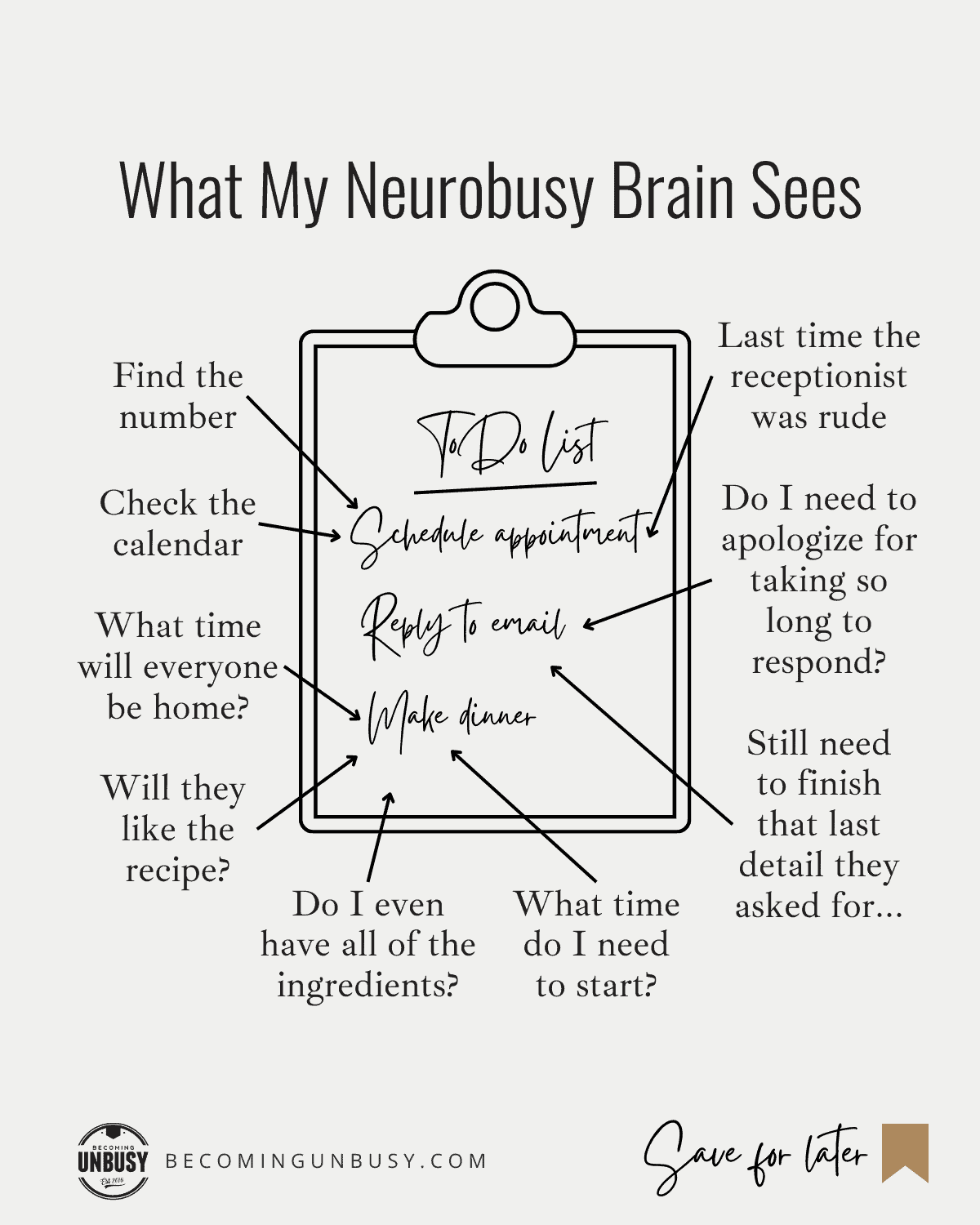
The prefrontal cortex can contribute to executive dysfunction and affect decision-making, cognitive flexibility, motivation, time management, and reward anticipation, creating optimal conditions for task paralysis.
What triggers task paralysis?
Task paralysis can be triggered in many different ways, including:
- The anticipation of a big, important task
- The nagging of a small, mundane task
- The overwhelm of a growing and unmanaged to-do list
The longer you avoid the task, the more the overwhelm and dread grows. This causes the task paralysis to worsen. It's a terrible negative feedback loop that can cause a downward spiral.
The ongoing impact
Task paralysis can have detrimental effects. Failing to follow through with promised tasks can cause riffs in relationships — personal and professional.
The impact of task paralysis can also be financial. It's not uncommon for people with task paralysis to wait until the very last minute to complete things — the delay usually costs money (e.g. needing to pay for express shipping), energy (having to stay up all night to meet a deadline), and stress.
For individuals who are neurobusy, task paralysis can be particularly debilitating. The inherent difficulties in maintaining focus, regulating attention, and managing impulsivity make chronically overwhelmed people more susceptible to getting caught in a cycle of task paralysis. This vicious cycle leads to increased apathy, loss of self-esteem, and decreased overall productivity.
How to overcome task paralysis
The first step? Stop beating yourself up, my friend. You are not alone.

Here are four ways to honor your wiring and start to overcome task paralysis.
- Novelty — The neurobusy brain loves novelty. If possible, switch up the location, who you're working with, what time of day you're doing the task, or even your approach.
- Gamification — The neurobusy brain loves a good challenge. Find a way to make the task into a competition with yourself or a friend.
- Urgency — The neurobusy brain thrives under pressure. Manufacture deadlines with external consequences. *Be cautious of implementing this approach too often!
- Interest — The neurobusy brain is passionate. If the task is boring, add interest in how you execute the task instead. Love the outdoors? Try working outside. Love art? Use colorful markers.
Bonus tips for getting unstuck
Shrink The Elephant — When stuck with an elephant-sized task, start by giving yourself a bit of momentum. Ask yourself, "What is the next ridiculously small step I can take?"
Body Doubling — Doing a task with someone is a simple way to stay committed to completing a task. Your partner doesn't have to be working on the same task; just being there physically with you helps.
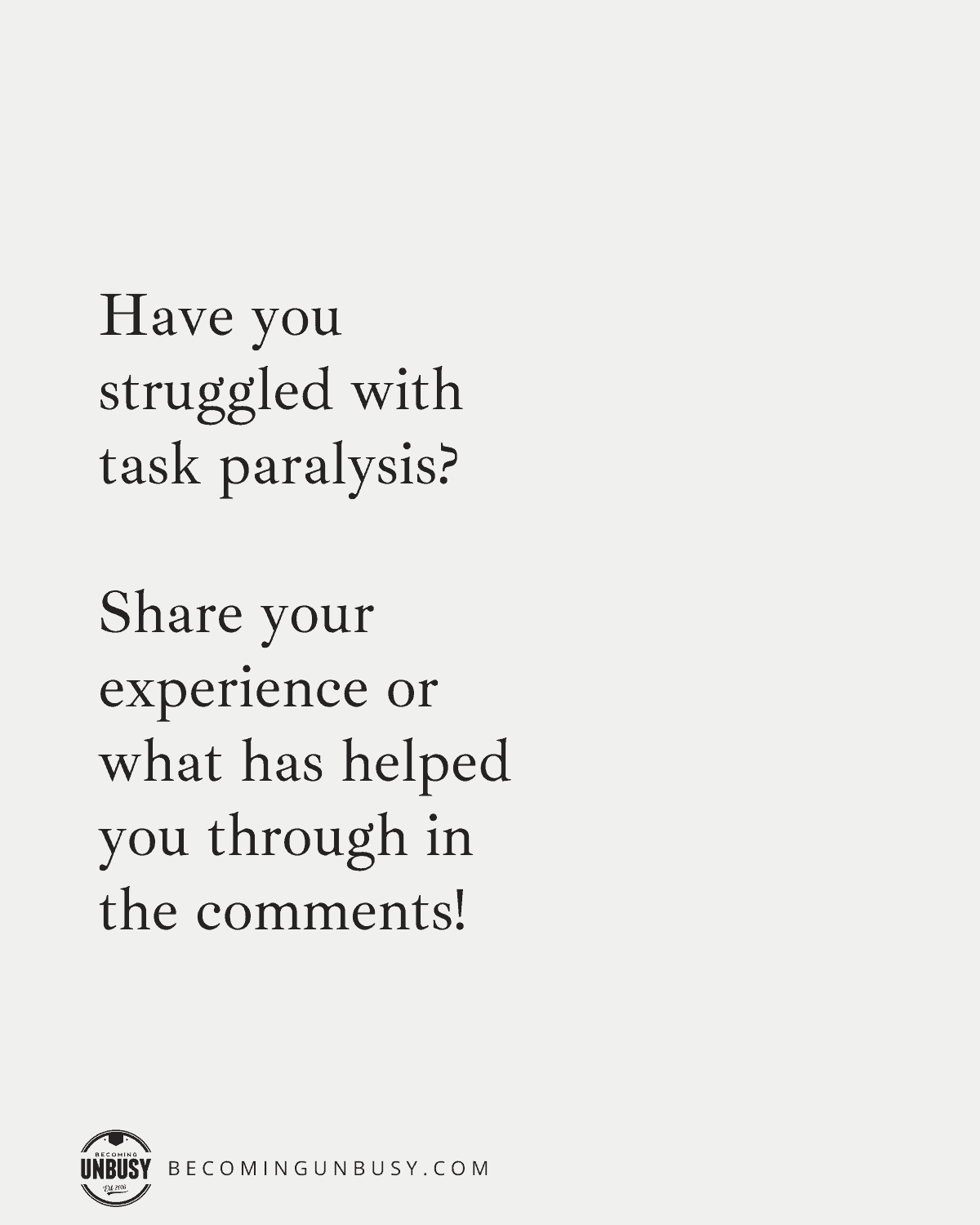
More Helpful Resources
Key Points
- Task Paralysis is the inability to take action, even if you know something is important and desperately want to complete a task. It is a common experience for neurobusy people.
- Task paralysis is real! The term refers to a mental state of overwhelm (related to the prefrontal cortex) in which someone cannot motivate themselves to finish a task.
- Task paralysis feels a bit like being stuck in a traffic jam. You know a task needs to be completed, you're aware of its importance, and you're even eager to complete it, but you're just stuck.
- Common symptoms of task paralysis include task avoidance, using mindless tasks to avoid the one task that needs to be completed, waiting until the last minute to complete tasks, decreased self-esteem, and increased anxiety.
- Task paralysis and casual procrastination are not the same. Task paralysis is a debilitating state that leaves you powerless against waves of shame, doubt, or dread.
- It can be hard for others to understand why neurobusy people experience task paralysis, often resulting in frustration.
- The prefrontal cortex (PFC) is responsible for "executive functioning," a term for the mental processes that enable us to plan, organize, focus attention, make decisions, and manage time effectively.
- Being neurobusy can clutter your mind with uncontrolled thoughts, making even the simplest tasks daunting.
- Task paralysis can have detrimental effects. Failing to follow through with promised tasks can cause personal/professional riffs, financial repercussions, and a debilitating cycle of reoccurrence.
- Recognizing you're neurobusy allows you to let go of cookie-cutter tips for procrastination and productivity and honor your wiring with novelty, gamification, urgency, and passion.
Did you find this post on task paralysis insightful? Sharing it would make our week ♥
It would make our week if you took a second to save or share this post. That’s how we know we’re on the right track and should continue writing more content like this!







